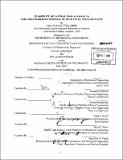| dc.contributor.advisor | Michael J. Driscoll, Jacopo Buongiorno and Mark S. Welsh. | en_US |
| dc.contributor.author | Gibbs, Jonathan Sutton | en_US |
| dc.contributor.other | Massachusetts Institute of Technology. Dept. of Nuclear Science and Engineering. | en_US |
| dc.date.accessioned | 2011-06-06T17:46:06Z | |
| dc.date.available | 2011-06-06T17:46:06Z | |
| dc.date.copyright | 2010 | en_US |
| dc.date.issued | 2010 | en_US |
| dc.identifier.uri | http://hdl.handle.net/1721.1/63242 | |
| dc.description | Thesis (Nav. E.)--Massachusetts Institute of Technology, Dept. of Mechanical Engineering; and, (Nucl. E.)-- Massachusetts Institute of Technology, Dept. of Nuclear Science and Engineering, 2010. | en_US |
| dc.description | Cataloged from PDF version of thesis. | en_US |
| dc.description | Includes bibliographical references (p. 151-154). | en_US |
| dc.description.abstract | The U.S. Department of Energy recently filed a motion to withdraw the Nuclear Regulatory Commission license application for the High Level Waste Repository at Yucca Mountain in Nevada. As the U.S. has focused exclusively on geologic disposal in shallow mined repositories for the past two decades, an examination of disposal alternatives will be necessary should the Yucca Mountain Project be terminated. This provides an opportunity to study other promising waste disposal technologies. One such technology is the use of very deep boreholes in monolithic granite to permanently segregate high level wastes from the biosphere. While research in this field has focused on vertical emplacement techniques, horizontal emplacement offers the significant advantages of allowing increased emplacement lengths without crushing of the waste package and the use of a single vertical shaft for drilling multiple horizontal shafts. This project examines the application of currently deployed oil and natural gas directional drilling techniques to borehole design. A large trade-space of potential borehole configurations is evaluated and a final design selected using the "V-DeepBoRe" code, a Monte-Carlo simulation based cost model for borehole construction and waste package emplacement. Waste repackaging and reconstitution is evaluated to permit deployment of waste in borehole diameters too small for intact fuel assemblies. A 5 m x 195.26 mm (OD) cylindrical waste package is designed using P-110 drill string steel to meet strength and thermal loading requirements; fuel centerline temperatures are shown to not exceed 190'C by analytical and finite element methods. The total cost of a national borehole repository (including drilling, consolidating and encapsulating the fuel, emplacement, and closure) is shown to fall below $63/kgHM, well within the capacity of the DOE Commercial Spent Nuclear Fuel Waste Fund. | en_US |
| dc.description.statementofresponsibility | by Jonathan Sutton Gibbs. | en_US |
| dc.format.extent | 154 p. | en_US |
| dc.language.iso | eng | en_US |
| dc.publisher | Massachusetts Institute of Technology | en_US |
| dc.rights | M.I.T. theses are protected by
copyright. They may be viewed from this source for any purpose, but
reproduction or distribution in any format is prohibited without written
permission. See provided URL for inquiries about permission. | en_US |
| dc.rights.uri | http://dspace.mit.edu/handle/1721.1/7582 | en_US |
| dc.subject | Mechanical Engineering. | en_US |
| dc.subject | Nuclear Science and Engineering. | en_US |
| dc.title | Feasibility of lateral emplacement in very deep borehole disposal of high level nuclear waste | en_US |
| dc.type | Thesis | en_US |
| dc.description.degree | Nucl.E. | en_US |
| dc.description.degree | Nav.E. | en_US |
| dc.contributor.department | Massachusetts Institute of Technology. Department of Mechanical Engineering | |
| dc.contributor.department | Massachusetts Institute of Technology. Department of Nuclear Science and Engineering | |
| dc.identifier.oclc | 726746619 | en_US |
